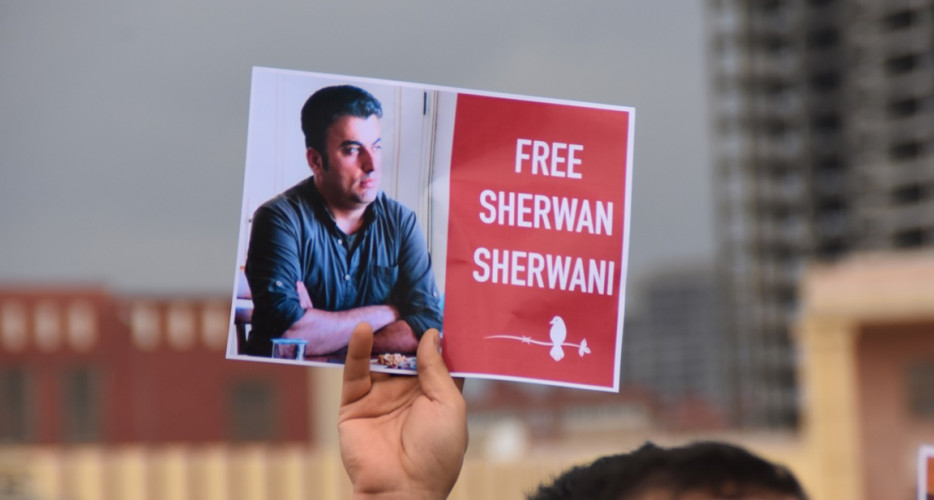CPJ representative says the conviction of journalists in Iraqi Kurdistan is “disproportionate and unfair”

Peregraf- Renwar Najm
The sentence of journalists in the Kurdistan Region of Iraq is “disproportionate and unfair”, and the evidence produced in the trial was “insufficient, circumstantial, and inconclusive,” says The Committee to Protect Journalists (CPJ) Middle East and North Africa Representative Ignacio Miguel Delgado.
On Tuesday, a court in Erbil convicted five journalists and activists, Sherwan Sherwani, Guhdar Zebari, Ayaz Karam, Shivan Omar and Hariwan Issa, to six years in prison each for violating Section 1 of Law 21 (2003) of the Iraqi Penal Code, which criminalizes actions that undermine the independence, unity, or security of the country.
The ruling followed by outrage from the public, Kurdish political parties, lawmakers, and international and local watchdog organizations, blaming the ruling to be “unfair” and “politically motivated.”
“CPJ talked to Sherwan Amin Sherwani’s lawyer and other sources, and we think the sentence is disproportionate and unfair and the evidence produced in the trial was insufficient, circumstantial, and inconclusive,” CPJ Middle East and North Africa Representative Ignacio Miguel Delgado told Peregraf.
In response, The Kurdistan Region’s Judicial Council insisted in a statement on Wednesday that the judicial process was “conducted openly and transparently” and “the trial was fair.”
However, according to Rizgar Amin, renowned Kurdish judge and a member of Kurdistan’s Cassation Court, the state of justice and the rule of law in Iraq and the Kurdistan Region in particular “has never been worse past 40 years”. The Kurdistan Region Court of Appeal has the authority to annul the verdict within 30 days and that the defendants can be released afterwards.
A week before the trial, Kurdistan Regional Government (KRG) Prime Minister Masrour Barzani accused the defendants of being “spies” and “saboteurs.” Barzani alleged that those journalists and activists worked for other countries during a press conference, describing them as “destructive and armed.”
“We believe that the remarks made by Prime Minister Masrour Barzani a week before the trial accusing the journalists of being spies without producing any evidence to support his assertion were very unfortunate,” said CPJ’s MENA representative. “They have been sentenced to nothing less than six years in jail for basically criticizing the authorities of a region that repeatedly claims to respect press freedom and freedom of expression, but that consistently harass, assault, and detain journalists covering protests across Kurdistan and close down broadcasters that are critical of the government,” he added.
Following the outrage, Kurdistan Region President Nechirvan Barzani also released a statement on the case stating that he is watching the issue and said: “it is the duty of the [Kurdistan’s] Appellate Court to review the case, relying on and respecting the law, human rights, and the legal rights of the defendant and the plaintiff so that everyone feels that their rights are protected.”
Sherwan Sherwani was arrested on October 7, 2020, while Guhdar Zebari, Ayaz Karam, Shivan Omar and Hariwan Issa were arrested on October 22, 2020, after social media posts echoing protesters’ demands and complaints, including complaints about delays in paying the salaries of state employees and allegations of government corruption. Still, dozens of other activists and protesters behind bars in Erbil and Duhok waiting for their trials.
Responding to widespread criticisms over the controversial ruling, KRG’s Coordinator for International Advocacy Dindar Zebari said that the trial was held “transparently and openly” with the presence of observers from the “diplomatic community and local NGOs”. Zebari also questioned international watchdogs’ reports, including CPJ, saying that they were given “false information.”
“CPJ is very rigorous in its research, and we double source our information. Mr Zebari is entitled to his views and to provide the government’s version of events, but the fact remains that two journalists who have a track record of being very critical of the ruling party and the Kurdish government have been sentenced to six years in jail on baseless evidence,” Ignacio responded.
Concerns over the state of freedom of expression in the Kurdistan Region of Iraq have risen in the last few years. Numerous international reports have been issued over violations of freedom of expression, violence against journalists, and closing media outlets; however, the KRG has not taken necessary action to address the violations, and on the contrary, they have neglected the recommendations.
“Freedom of expression is on the brink of extinction. Speaking of murdered journalists, like Wedat Hussein, is a red line. Reporting on corruption involving members of the ruling party or on any ties to the ruling Barzani family is impossible. Freelancers have no rights in Kurdistan,” Gohdar Zebari, one of the journalists who convicted to six years in prison las Tuesday, told CPJ a few months before his detention.
According to CPJ’s MENA representative, over the past two years and since Masrour Barzani took office, they have witnessed a deterioration of press freedom in Iraqi Kurdistan, “we have documented an increase in instances of harassment, assault, and detention of journalists covering protests over unpaid salaries for public servants and lack of basic services, as well as the seizure of their equipment”.
“Authorities always bring up the existence of the Kurdistan Press Law as proof of the region’s respect for press freedom, but when journalists are arrested, this law is always circumvented and other laws, including the Iraqi penal Code or the law on misuse of communication devices are applied instead.”